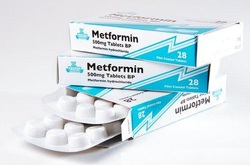Pharmacology definition - Metformin

Metformin
Metformin is useful in treating patient with non insulin dependent type 2 diabetes mellitus. Metformin is also known as biguanides. Metformin will inhibit hepatic gluconeogenesis and reduce the level of glucose. Metformin will increase HDL cholesterol and reduce the level of LDL cholesterol and VLDL cholesterol. Metformin will improve the lipid profiles.
Metformin will carry its own side effects such as gastrointestinal discomfort, impaired in the absorption of vitamin B12 and lactic acidosis. Metformin should not be taken in patient with renal insufficiency as the kidney may not be able to excrete metformin.
Metformin is useful in treating patient with non insulin dependent type 2 diabetes mellitus. Metformin is also known as biguanides. Metformin will inhibit hepatic gluconeogenesis and reduce the level of glucose. Metformin will increase HDL cholesterol and reduce the level of LDL cholesterol and VLDL cholesterol. Metformin will improve the lipid profiles.
Metformin will carry its own side effects such as gastrointestinal discomfort, impaired in the absorption of vitamin B12 and lactic acidosis. Metformin should not be taken in patient with renal insufficiency as the kidney may not be able to excrete metformin.
